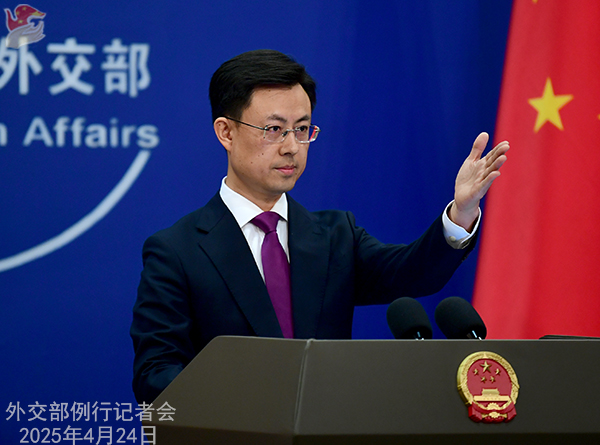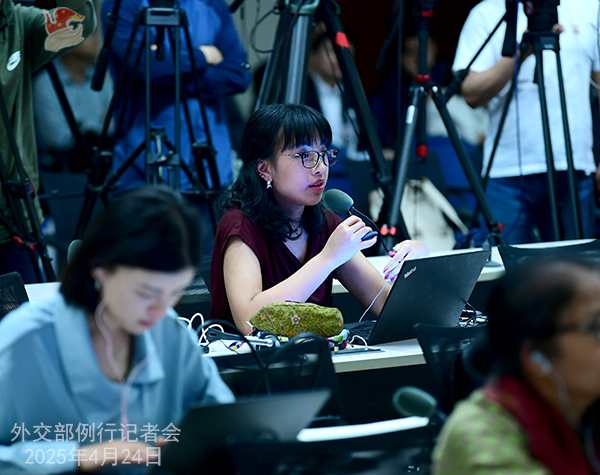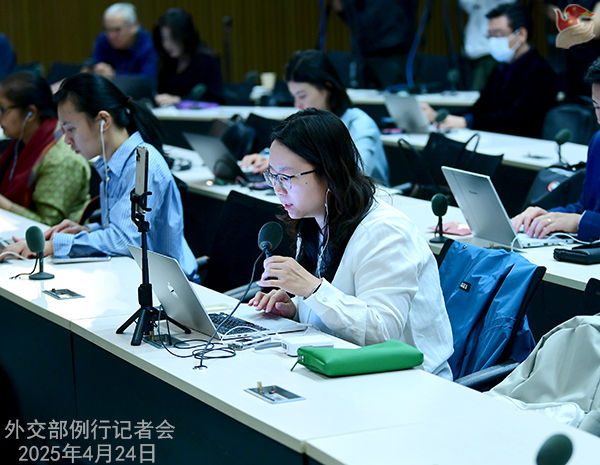
The People’s Republic of China


Phoenix TV: We’ve been hearing the U.S. say that China and the U.S. are having talks and even about to reach a deal. Can you confirm whether the two sides are in talks?
Guo Jiakun: None of that is true. For all I know, China and the U.S. are not having any consultation or negotiation on tariffs, still less reaching a deal.
This tariff war is launched by the U.S. China’s position is consistent and clear: We will fight, if fight we must. Our doors are open, if the U.S. wants to talk. Dialogue and negotiation must be based on equality, respect and mutual benefit.
China News Service: It’s reported that during the state visit to China by President of Azerbaijan Ilham Aliyev, China and Azerbaijan signed a mutual visa exemption agreement. What is China’s comment on this?
Guo Jiakun: China and Azerbaijan are good friends who treat each other with sincerity and trust, and good partners who see each other as equals and pursue mutual benefit. Under the strategic guidance of the two presidents, the two countries have seen ever-deepening cooperation in various areas. During President Aliyev’s visit to China, the two governments officially signed the agreement on mutual visa exemption for holders of ordinary passports. This will further facilitate cross-border travel, build closer bond between the two peoples, and deepen the China-Azerbaijan comprehensive strategic partnership.
AFP: A U.S. army intelligence analyst was sentenced to seven-year imprisonment on Wednesday for providing sensitive defense information to China, including documents about weapon systems and military tactics. Does the Foreign Ministry have a comment on this?
Guo Jiakun: I’m not familiar with what you mentioned.
Global Times: It’s reported that in a recent statement, the Philippines asserted that no permission was sought from, nor granted by, China for the conduct of its resupply mission to Ren’ai Jiao on March 4 and said that it does not recognize Beijing’s authority over Ren’ai Jiao. What’s China’s response?
Guo Jiakun: China has sovereignty over Nansha Qundao, which include Ren’ai Jiao, and their adjacent waters. China’s position on how to handle the current situation at Ren’ai Jiao is clear and consistent. First, by keeping its warship grounded at Ren’ai Jiao for decades running, the Philippines has been violating China’s sovereignty and the Declaration on the Conduct of Parties in the South China Sea (DOC). We demand that the Philippines tow away the warship. Second, between now and when the warship is towed away, should the Philippines need to send living necessities, China is willing to allow it in a humanitarian spirit if the Philippines informs China in advance and after on-site verification is conducted. Third, if the Philippines were to send large amount of construction materials to the warship and attempt to build fixed facilities or permanent outpost, China will absolutely not accept it and will resolutely stop it in accordance with the law and regulations.
On the basis of the above principled position, last July, China reached provisional arrangement with the Philippines on humanitarian resupply of living necessities. Since then, based on the provisional arrangement, the Philippine side has conducted seven resupply missions of living necessities. The entire process was monitored by China Coast Guard. China had been informed of the resupply before it was carried out, and confirmed on-the-scene that the Philippine vessel carried only humanitarian living necessities.
The Chinese side will continue to firmly defend China’s sovereignty and rights and interests. We urge the Philippines not to take for granted China’s active effort to get the situation at sea under control, honor its commitments, and stop flip-flopping on them and creating troubles.
AFP: We are seeing reports that Manila’s National Security Council today said that there were indications of China’s possible interference in the Philippines’ elections in May. Does the Foreign Ministry have a comment on this?
Guo Jiakun: China follows the principle of non-interference in other countries’ domestic affairs. We have no interest in interfering in Philippine elections.
Reuters: Is China planning to send anyone to the Pope’s funeral and if so, who will attend?
Guo Jiakun: I have no information to share at the moment.
Beijing Youth Daily: It was reported that giant pandas He Feng and Lan Yun arrived at Schönbrunn Zoo in Austria yesterday as a continuation of China-Austria cooperation on giant panda research. This is also the first international cooperation project on giant panda conservation launched in 2025. What is your comment?
Guo Jiakun: We learned that giant pandas He Feng and Lan Yun arrived at Schönbrunn Zoo in Austria on the afternoon of April 23, Beijing time, marking the start of a new round of China-Austria cooperation on giant panda conservation and renewing the 20-plus years of “panda friendship” between the two peoples.
As the first international cooperation project on giant panda conservation launched this year, China-Austria cooperation on giant panda conservation fully illustrates a sound cooperation mechanism built by the two countries and fruitful outcomes it has yielded. Giant panda is not only a national treasure of China but also emissaries and bridges for friendship. Giant panda conservation is not only a shining hallmark of China’s ecological conservation and a successful story of global wildlife conservation, but also instrumental in enhancing people-to-people friendship. China is ready to work with international partners to continue our exchanges and cooperation in the protection of giant pandas and other endangered species, and make even greater contributions to global ecological conservation.

AFP: Boeing CEO confirmed on Wednesday that China had stopped accepting new aircraft due to the U.S.-China trade war. Can the Foreign Ministry confirm this and do you have a comment on this?
Guo Jiakun: I’d refer you to competent authorities on that.
Reuters: The People’s Bank of China governor and the Finance Minister are reportedly in Washington for the IMF meeting. Are there any meetings planned with members of the Trump administration while they’re in Washington?
Guo Jiakun: China has released information about the Chinese delegation’s attendance at the relevant meeting. As for your specific question, I’d refer you to competent authorities.
Reuters: The South Korean government expressed concerns yesterday about the Chinese fishing structure in the Yellow Sea. Is there any comment from the Foreign Ministry?
Guo Jiakun: We have made clear China’s position on this issue multiple times. As for the remarks made by the ROK that you just mentioned, I would like to point out that what China set up in the provisional measures zone (PMZ) are the aquaculture facilities. And relevant activities of China are consistent with China’s domestic law and international law. They do not contravene the China-ROK Fishery Agreement and have nothing to do with maritime delimitation. China is ready to continue to strengthen dialogue and communication with the ROK to properly handle relevant issues.
NHK: I also have a question about tariffs. The Wall Street Journal reported that the Trump administration may reduce tariffs on Chinese imports in some cases by more than half. Additionally, President Trump said it depends on China how soon the tariffs can come down. What is your reaction to this news and statement?
Guo Jiakun: I just made clear China’s position. Let me stress again that this tariff war is launched by the U.S., and China’s attitude is consistent and clear. If a negotiated solution is truly what the U.S. wants, it should stop exerting extreme pressure, stop threatening and blackmailing China, and seek dialogue based on equality, respect and mutual benefit.
AFP: U.S. Treasury Secretary Scott Bessent said on Wednesday that Beijing’s export reliant economic model is unsustainable and harms both China and the rest of the world. What is the Foreign Ministry’s comment on this?
Guo Jiakun: The truth, which is clear to all, is that the U.S. tariffs are seriously undermining the WTO rules and harming the common interests of all countries.
Reuters: South Korea said that DeepSeek is transferring user data and prompts without consent out of the country. Any comment from the Foreign Ministry?
Guo Jiakun: I’m not familiar with the exact situation that you mentioned, but let me stress that the Chinese government takes data privacy and security very seriously and protects it in accordance with the law. We have never asked and will never ask any company or individual to collect or store data for the Chinese government against laws. China has all along opposed moves to overstretch the concept of national security or politicize trade and tech issues. Meanwhile, we will also firmly protect the lawful rights and interests of Chinese companies.




